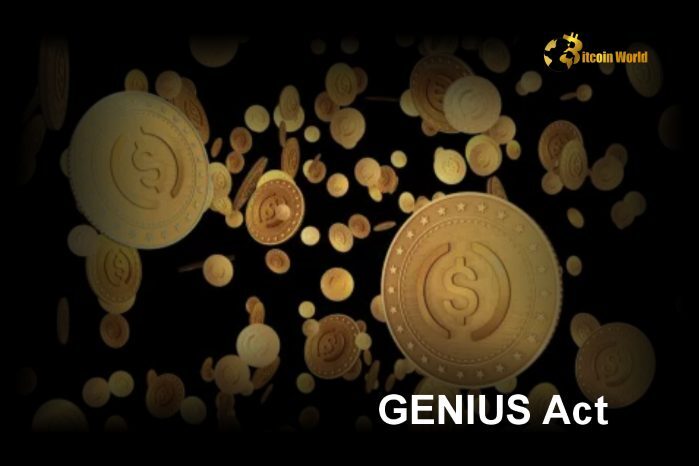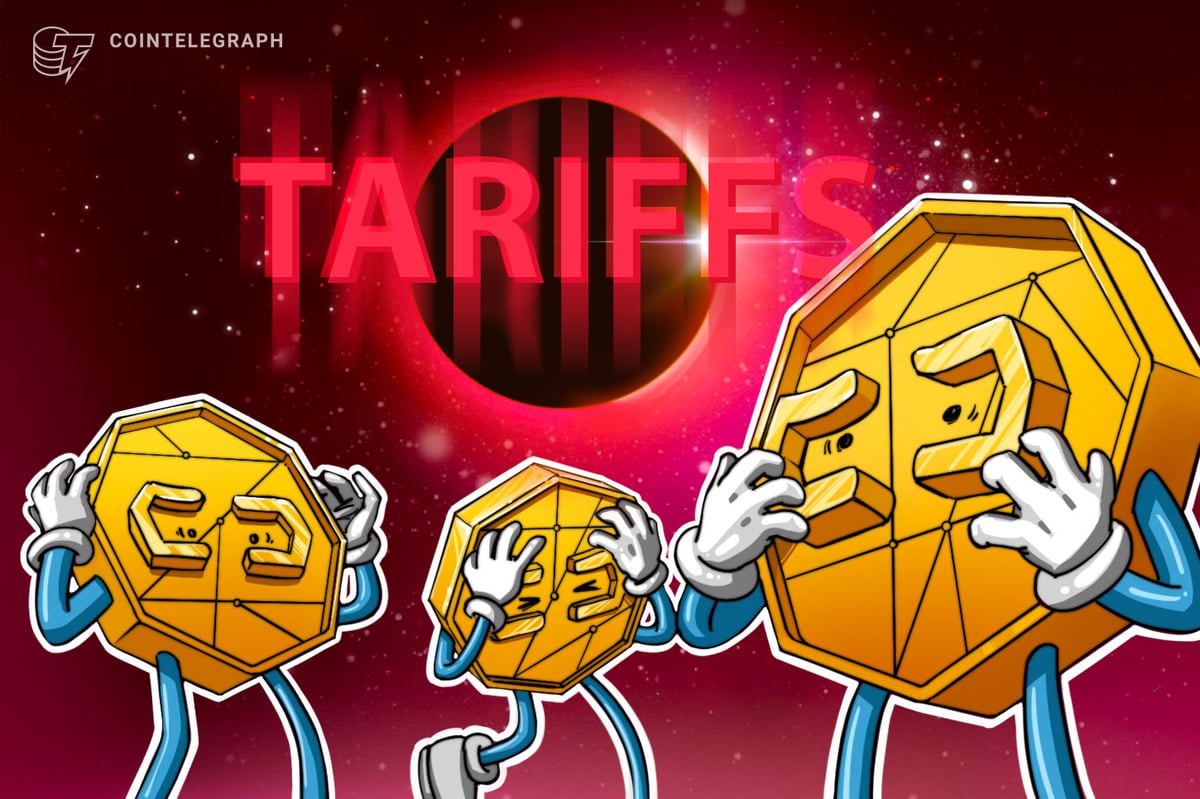In the ever-evolving world of cryptocurrency, regulations are constantly playing catch-up to innovation. A significant development is brewing in the United States that could reshape the landscape of stablecoins regulation, particularly concerning those operating outside U.S. borders. Senator Bill Hagerty’s revised Guiding and Establishing National Innovation for U.S. Stablecoins (GENIUS Act) proposal is making waves with its broadened scope, now casting a wider regulatory net over offshore stablecoins. Let’s dive into what this means for the crypto world and what changes are on the horizon.
What’s New in the Revised GENIUS Act and Why Should You Care About Stablecoins Regulation?
According to Fox Business reporter Eleanor Terrett, the updated GENIUS Act isn’t just tweaking the edges; it’s significantly expanding its reach. Originally focused on domestic stablecoin issuers, the revised proposal now extends its gaze to offshore stablecoins. But why is this important, and why now?
Stablecoins, cryptocurrencies designed to maintain a stable value (often pegged to the US dollar), have become a cornerstone of the crypto market. They facilitate trading, provide a safe haven from volatile crypto assets, and are increasingly used in cross-border transactions. However, their rapid growth and potential for systemic risk have caught the attention of regulators worldwide. The U.S., a major player in global finance, is keen to establish a robust framework for crypto regulation, and stablecoins are a key piece of this puzzle.
The revised GENIUS Act is a direct response to these concerns, aiming to bring clarity and control to the often murky waters of offshore stablecoins. Here’s a breakdown of the key updates:
- Enhanced Reserve Requirements: The bill mandates detailed requirements for the reserves backing offshore stablecoins. This is crucial to ensure that these digital currencies are truly stable and can withstand market shocks. Think of it like ensuring a bank has enough cash on hand to cover withdrawals – it’s about maintaining trust and preventing collapses.
- Robust Regulatory Oversight: Expect stricter oversight mechanisms. The act aims to define which regulatory bodies will be responsible for monitoring and enforcing compliance for offshore stablecoins interacting with the U.S. financial system. This could mean increased scrutiny and potential licensing requirements for offshore entities.
- Anti-Money Laundering (AML) and Counter-Terrorism Financing (CTF) Measures: In today’s global landscape, preventing illicit financial activities is paramount. The revised act incorporates stronger AML and CTF measures to ensure offshore stablecoins aren’t used for illegal purposes. This aligns with global efforts to combat financial crime in the digital age.
- Sanctions Compliance: The bill emphasizes adherence to U.S. sanctions. Offshore stablecoins operating in or with the U.S. will need to demonstrate strict compliance with sanctions regimes, preventing their use in bypassing international law.
- Liquidity and Risk Management: Beyond reserves, the act delves into broader liquidity and risk management frameworks. This suggests a holistic approach to ensuring the financial soundness of offshore stablecoins, looking at their operational resilience and ability to manage various market risks.
Why Focus on Offshore Stablecoins? Understanding the US Stablecoin Policy Shift
The expansion of the GENIUS Act to include offshore stablecoins reflects a growing recognition that the crypto market is inherently global. Simply regulating domestic issuers isn’t enough when digital currencies can easily cross borders. This shift in US stablecoin policy is driven by several factors:
- Global Interconnectedness: The crypto market is not confined by geographical boundaries. Offshore stablecoins can and do interact with the U.S. financial system, necessitating a broader regulatory approach.
- Level Playing Field: By extending regulations to offshore stablecoins, the U.S. aims to create a more level playing field for domestic and international players. This can prevent regulatory arbitrage, where entities might seek to operate outside stricter jurisdictions to avoid compliance.
- Protecting the US Dollar: Many stablecoins are pegged to the U.S. dollar. Ensuring the stability and integrity of these dollar-linked digital assets, regardless of their issuer’s location, is crucial for maintaining confidence in the U.S. dollar’s role in the digital economy.
- Supporting Cross-Border Transactions: While tightening regulation, the GENIUS Act also aims to support legitimate cross-border transactions. The goal isn’t to stifle innovation but to create a framework that fosters safe and compliant international use of stablecoins.
What are the Potential Benefits and Challenges of Expanded Crypto Regulation?
The revised GENIUS Act, with its focus on offshore stablecoins and broader crypto regulation, presents both potential benefits and challenges:
| Benefits | Challenges |
|---|---|
|
|
Actionable Insights: What to Watch For Next in Stablecoins Regulation
For those in the crypto space, staying informed about these regulatory developments is crucial. Here’s what to keep an eye on:
- Senate Banking Committee Markup (March 13): As Terrett reported, the Senate Banking Committee is expected to conduct a markup of the bill on March 13. This will be a key event to watch for further details and potential amendments to the GENIUS Act.
- Industry Reactions: Monitor how crypto industry players, both domestic and offshore stablecoin issuers, react to the revised proposal. Their feedback and lobbying efforts could influence the final shape of the legislation.
- Global Regulatory Trends: The U.S. isn’t alone in grappling with crypto regulation. Pay attention to how other major jurisdictions are approaching stablecoins. International alignment or divergence in regulations will significantly impact the global crypto landscape.
- Technological Adaptations: As regulations evolve, expect to see technological innovations aimed at facilitating compliance and navigating the new regulatory landscape. This could include advancements in AML/CTF technologies and transparency tools for stablecoin reserves.
Conclusion: A Significant Step Towards Robust Crypto Regulation
Senator Hagerty’s revised GENIUS Act represents a crucial and expanded step towards establishing a comprehensive framework for stablecoins regulation in the U.S., particularly concerning offshore stablecoins. By addressing key areas like reserves, oversight, AML/CTF, and sanctions compliance, the bill aims to create a safer and more stable environment for digital currencies while supporting cross-border innovation. While challenges remain in implementation and global coordination, this legislative push signals a clear direction: crypto regulation is maturing, and stablecoins are at the forefront of this evolution. Keeping a close watch on its progress is essential for anyone involved or interested in the future of digital finance.













 All while Pfizer—a company with a $2.3 billion criminal fine for fraudulent marketing, bribery, and kickbacks—was given blanket immunity from liability and billions in taxpayer dollars to produce a vaccine in record time with no long-term safety data.
All while Pfizer—a company with a $2.3 billion criminal fine for fraudulent marketing, bribery, and kickbacks—was given blanket immunity from liability and billions in taxpayer dollars to produce a vaccine in record time with no long-term safety data.
























